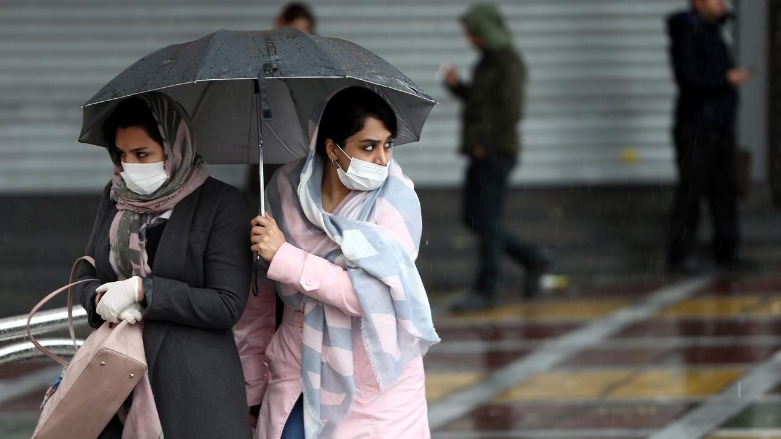Iran’s Deputy Health Minister reveals he has coronavirus, amid continuing concern over its spread

WASHINGTON DC (Kurdistan 24) - Just one day after he participated in a press conference on the coronavirus outbreak in Iran, the country’s Deputy Health Minister, Iraj Harirchi, revealed on Tuesday that he, too, had contracted the virus.
In a video, broadcast on Iranian television, Harirchi spoke from what appeared to be a hospital bed. “I wanted to tell you that I am also infected with the coronavirus. I had a fever yesterday and the initial test was positive last night after which I immediately isolated myself,” he told Iranians, while affirming that, nonetheless, “we will defeat the virus in the coming weeks.”
In Monday’s press briefing, Harirchi stood alongside government spokesperson, Ali Rabiei, as both affirmed that although coronavirus cases had appeared in Iran, they were limited. Only 12 people had died, they said.
Qom is the epicenter of the Iranian outbreak, and a lawmaker from Qom, Ahmad Amirabadi Farahani, speaking in parliament on Monday, disputed the official claim. Accusing the government of a cover-up, Farahani said 50 people had already died in Qom from the disease.
READ MORE: From Iran, coronavirus spreads to five regional states
Harirchi, who was seen repeatedly wiping his face during the press conference, challenged Farahani, saying, “Anyone making such claims” should “provide a list of those names,” as the health ministry "is very confident" about its figures.

"I say it here publicly,” Harirchi continued, “I will resign, if the number of those who died in Qom due to this disease is half or even one-quarter of the number.”
Farhani later stated that he had provided the health ministry with the names of 40 people who had died in Qom from the virus.
Farhani’s criticism does not come from dissident elements in Iran. Rather, Farhani is very much part of Iran’s revolutionary establishment. Earlier, he was an officer in Iran’s Islamic Revolutionary Guard Corps (IRGC), in which he served for 16 years, until 2006, after which he was elected to Qom’s City Council, before becoming a parliamentarian.
As of Tuesday, Iran has officially acknowledged the deaths of 15 people from the virus. That represents the largest number of fatalities outside China.
Iranian officials have provided no clear account of how the disease reached their country. One possibility involves the Iranian airliner, Mahan Air, which is associated with the IRGC. Already in 2011, under the Obama administration, the US sanctioned the airliner for its support of the IRGC’s Quds Force.
On Jan 31, Iran officially ended flights to and from China, but Mahan Air continued to fly there. Reportedly, it began to take Chinese passengers, who faced difficulties leaving their country, because so many international airlines have stopped flying into China and Chinese carriers have been banned from entering many countries.
Challenge to Religious-Political Establishment
As Qom is the epicenter of the outbreak in Iran, established public health procedures would appear to mandate the imposition of strict quarantine procedures there. However, Qom is one of the two holiest cities in Shi’a Islam, the other being Najaf, in Iraq.
Iran’s clerical establishment has rejected efforts to impose a quarantine on Qom, and the government appears to have accommodated that position.
On Tuesday, Iran’s Health Minister, Saeed Namaki, dismissed quarantine as an “old method,” even though extensive quarantine measures, involving tens of millions of people, were a key step in what appears to have been China’s successful effort to bring the disease under control.
"We still do not agree with quarantining cities,” Namaki said, “since we believe the people are cultured enough to refrain from traveling from infected cities to other places.”
As BBC Persian noted, “There are grand ayatollahs in Qom who believe that its shrine, which attracts millions of pilgrims from around the world, and its important seminary” are “the pride of the Shia world.”
“Shutting them down would be a huge step for the clerics and not one that they would be likely to take unless they come under international pressure,” the BBC continued.
An “aide to one of the most senior grand ayatollahs in Qom, Mousa Shubairi Zanjani, has died of the disease,” The Financial Times reported on Tuesday.
It is unclear how many senior Iranian figures have been affected by the coronavirus. A parliamentarian from Tehran, Mahmoud Sadeghi, tweeted on Tuesday that he, too, had caught the virus.
US Secretary of State Mike Pompeo, speaking to journalists on Tuesday, called on “all nations, including Iran” to “tell the truth about the coronavirus and cooperate with international aid organizations.”
